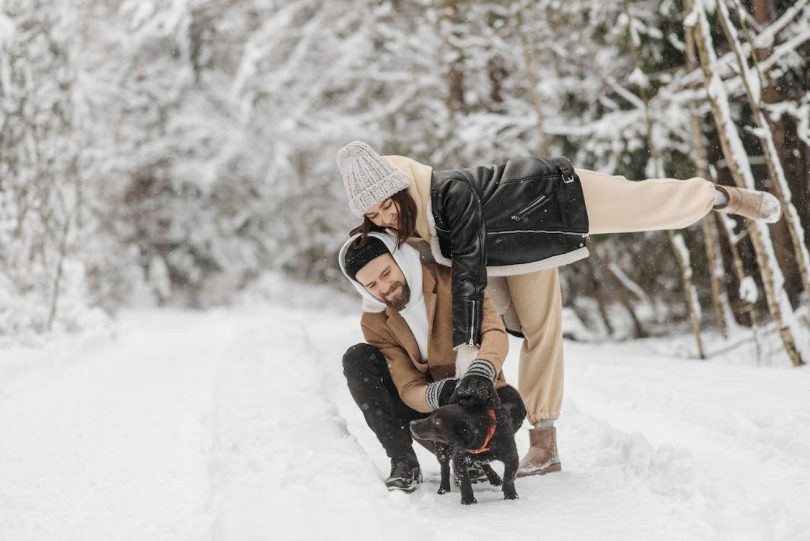Things to know before getting a dog can greatly be helpful in keeping your new dog happy and safe. You can make your first few days less hectic and stressful for you and your dog. Just ask any of your friends with dogs what is so special about owning a dog. There will be a plethora of good things they have to tell you. From great companionship, and loyalty to a fun and active demeanor that will keep you entertained.
Having low-maintenance dog breeds with less fur and good health will let you enjoy their company way better. However, when it comes to getting a puppy checklist then there are a number of factors to consider. If you are preparing to welcome a new puppy into your home then Congratulations! This will surely be a life-changing experience. You will want to make sure that you are well-prepared to give your pup the best start possible.
To help make sure you don’t forget anything, we’ve compiled things to know before getting a dog or puppy (don’t worry they are almost the same with little difference). In it, you’ll find everything from the supplies needed before bringing your furry friend home, to helpful tips on training and developing a strong bond with them. Remember that for some, the first 48 hours with a new puppy can be exhausting.
They can be vocal and by vocal, we mean a lot noisy, it can take a little time for them to adjust to new embellishments and so on. Continue reading our getting a puppy checklist first before getting a new pup.
Things To Know When First Getting A Puppy
Let’s talk about the factors to consider before adopting your first puppy.
Do You Feel Ready For A New Puppy?
First thing first, you may feel tempted to get your first puppy or adopt one because you have seen your friends having great fun with them. Not only just that they may look cute, and do funny things, and overall, you feel overwhelmed and excited about the new puppy. This is great but are you ready to spend time with them? The first 48 hours with a new puppy can be extremely stressful. Even die-hard dog lovers admit this. Though adult dogs aren’t different puppies due to their tender age will find it hard to adjust.
Puppies have curious nature. They tend to be destructive. The hardest part of having a puppy is understanding its behavior and training them. They will lick and chew everything they find around them. Not only just that, but they will also eat everything in their environment. They require proper training to behave and socialize. Adopting a young puppy means spending a lot of extra time on training and behaving.
Search For The Bread
One of the Best pieces of advice for first-time dog owners would be to get bread that suits their lifestyle. Search around different breeders in your area to learn about the suitable dog breed. Also, use the internet and search for the perfect breeds for first-time dog owners so you will have multiple options to choose from. This is one of the most important aspects of adopting a dog.
You will need to consider your lifestyle, your job routine, your environment, your surroundings, and the time you want to spend with puppies. Time consideration should be a top consideration on getting a puppy checklist. Some breeds require extensive time which is why to consult with breeders and talk to the vets as well before getting a pup.
Time Consumption
One of the must things to know before getting a dog and also mentioned earlier that you will need to sacrifice your time. When it comes to puppy training then it can be a long and time-consuming process. Training a puppy can take anywhere from several weeks to several months, depending on the age of your puppy and the amount of time and effort you are willing to put in.
You will need to establish routines and set boundaries with your puppy right away, as this is essential for the success of their training. Another thing to know before getting a dog is that you will need to stay consistent with the commands and training methods you are using. It is important to remember that puppies learn best through positive reinforcement and repetition. Training your puppy requires patience, dedication, and consistency, but the rewards of having a well-trained pup are worth it in the end.
Essential Supplies & Accessories You Need Before Bringing Home Your Puppy
To ensure that your pup has the best start in life, it’s important to have all the essential supplies and accessories you need before bringing them home. From food, toys, and grooming supplies to crates, beds, and collars – having these items ready for your first 48 hours with a new puppy with you will help make their transition into your life smoother.
Knowing things to know before getting a dog is also key to having a successful relationship with them. Here are some things to consider when preparing for the arrival of your new furry friend! The first 48 hours of a puppy’s life are critical to its health, happiness, and future behavior.
– It is important that you train your puppy during the first week of its life to prevent common behavioral problems in adulthood such as leash reactivity, separation anxiety, mouthing, and barking.
– If a litter of puppies is found without mom around they will often start fighting each other for food and resources until one dies or becomes sick.
– Look up how you can save a dog in a hot car to learn what you should do if this happens with your own pup!
Health Care Needs For Your New Puppy & How to Find the Right Veterinarian
Having the right veterinarian is a key part of things to know when first getting a puppy, and there are some things you should know before getting a dog that will help you find the best fit for your new family member.
In the first 48 hours with a new puppy, it’s important to establish a routine for feeding and potty training. It can also be helpful to do some research on common health issues that affect puppies so you know what to look out for. One of the hardest parts of having a puppy is dealing with any illnesses or accidents that may arise, so having access to reliable veterinary care is essential.
Finding the right veterinarian for your pup doesn’t have to be difficult. The best advice for first time dog owners is to ask friends and family members who have had dogs in the past for recommendations. The best way to find an appropriate vet for your new family member is to search online, or ask your friends and neighbors what they have been happy with.
- Ask around to find the right vet for you!
- Plan ahead and make sure everyone in the family is prepared including any children. setting up a feeding routine that works well with your schedule, as well as knowing how/when/where dogs should go potty so you know where they are when they need attention.
- Ask questions about the general healthcare needs of puppies
- Research common illnesses and accidents associated with puppies so that you know what to look out for.
- Have a plan in place in case of an emergency, such as having the number of the vet or an emergency pet hospital on hand.
- Spend time getting to know the vet and the staff to ensure that you feel comfortable with the care your pup will receive.
Picking the Right Food & Treats For Your New Puppy
As a new pet parent, you want to make sure that you are making the right decisions for your pup’s health and well-being. One of the most important decisions you will make is picking the right food and treats for your new puppy.
The first 48 hours with a new pup can be overwhelming, but it’s also a great opportunity to introduce them to their new diet. It’s important to know what things to look out for when selecting food and treats for your pup – from ingredients, nutrition, allergies, and more. The hardest part of having a puppy is making sure that they get the right nutrition they need in order to grow up healthy and strong.
Getting advice from experienced pet parents can help make this process easier. Here are some of the best pieces of advice on how to pick the right food and treats for your new puppy:
- Consider your pup’s age, breed, and size when selecting food. Puppies have different nutritional needs than adult dogs and feeding them the wrong food can be detrimental to their health and growth.
- Look for food with high-quality ingredients. Avoid foods with fillers, by-products, and artificial colors and flavors.
- Talk to your vet. They can help you find the best food for your pup’s unique needs.
- Ask the breeder or pet store for the food the puppy was eating and transition him or her to a new food slowly.
- Give your pup treats in moderation. Too many treats can lead to obesity and dental problems.
- Avoid giving your pup table scraps. Human food is not always safe for dogs, and it can cause digestive issues.
- Read labels carefully and look for foods that are formulated specifically for puppies.
- Supplement your pup’s diet with nutritious snacks, such as vegetables or fruits.
- Make sure the food you choose is appropriate for puppies. Some adult dog foods are too rich and can be unhealthy for puppies.
- Ask your vet to recommend a food that meets your pup’s specific needs.
Puppy Proofing Your House
Puppies are adorable, fun, and full of energy and life. But, as any pet owner knows, their curious nature and lack of boundaries can lead to some big messes and destruction. To keep your puppy safe and your home in good condition, it’s important to puppy-proof your house. Puppy proofing is an essential part of getting a puppy checklist. Puppy-proofing is not only important for the safety of your pup, but it can also save you a lot of time and money in the long run. Here are some tips for puppy-proofing your home:
– Block off off-limit areas:
Another hardest part of having a puppy is that block off off-limit areas for them. Puppies have an inquisitive nature, so it’s important to block off areas of your home they shouldn’t access. This includes any dangerous or potentially hazardous areas, such as the kitchen, bathrooms, or laundry room. You can do this by using baby gates or keeping doors shut.
– Hide cords, wires, and electrical outlets:
Puppies love to chew on cords and wires. Make sure they’re out of reach or covered. You can use cord covers or tape them up to the wall. You should also cover any exposed electrical outlets.
– Remove hazardous objects:
The best advice for first time dog owner is to make sure to get rid of any small objects or items that can be hazardous if ingested, such as coins, paper clips, and small pieces of plastic. These can be choking hazards or cause other problems if swallowed.
– Secure furniture and other items:
Puppies can be quite active and curious, so you’ll want to secure furniture and other items to the floor. This can be the best advice for first time dog owner as it will prevent them from tipping over or being pulled down on top of your pup.
Provide plenty of toys. One of the best things to know when first getting a puppy is to get some nice squishy toys. Make sure you have plenty of toys for your pup to play with. This will help keep them occupied and out of trouble. You should also get some chew toys to help with teething.
Puppy-proofing your home is an important step in keeping your pup safe and out of trouble. Puppy-proof your house now will save you a lot of time and money in the long run. So make sure to follow these tips and keep your pup safe.
Conclusion
Getting your first puppy can be an exciting and overwhelming experience. However, you cannot just think about adopting a puppy because you like them. They need to be brought up in a healthy environment and require a responsible individual to care for them. Make sure you have read our guide regarding things to know before getting a dog. Make sure your experience would be less stressful and more fun for both you and your dog. Browse our blog for more pet care hacks.







